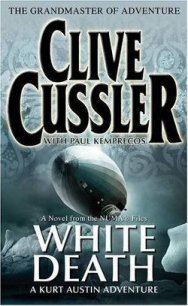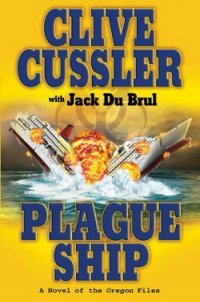Corsair - Cussler Clive (библиотека электронных книг txt) 📗
The two ships continued to pound on each other, each capable of absorbing tremendous punishment, as the gap grew narrower still. At point-blank range, there was no need to aim. Rounds impacted almost the instant they left the guns.
Nothing like this had been seen in the annals of naval warfare for a century, and despite the danger Max Hanley wouldn’t have wanted to be anyplace else in the world.
Not so for the Chairman and the men on deck. They were hunkered behind a section of rail that had been triple reinforced, but when a 30mm autocannon raked the bulwark they all felt naked and exposed.
Juan couldn’t imagine fighting this way as a normal course of events. Technology had sanitized warfare, made it cold and distant. The press of a button was all that was needed to vanquish your enemy. This was something else entirely. He could feel their hatred. It was as if each shot they took was an expression of personal loathing.
They wanted him dead. And not just dead but blown out of existence, as if he had never been born at all.
Another shell slammed into the armor plate, and for a moment it felt to Juan like his insides had liquefied. For a terrifying moment, he thought he had made a huge mistake.
Then he thought no, these people would not stop until someone stood up to them. If they wouldn’t listen to reason, they would have to face the consequences of their own barbarity.
There came a brutal shudder. The Oregon was alongside the Sidra. Max had known to ballast their ship so the two railings were even. Juan snatched up his compact machine pistol and threw himself over the side.
The shimmering trail of an RPG launched from a concealed redoubt astern of the Sidra’s rear turret passed inches over his head and hit the armored plate just as the rest of his twelve-man team was following. The hit couldn’t have been luckier or worse. Ten of the men were blown back by the blast, bloodied and suffering concussions, and two were tossed forward just as a wave separated the ships slightly. They plummeted down into the tight space and hit the water simultaneously.
Max had seen the disaster on the closed-circuit television system and immediately hauled the Oregon away from the Sidra so the hulls wouldn’t slam together and smear the men into paste. He didn’t know if they were alive or dead, but he ordered the rescue team standing by in the boat garage to immediately launch a Zodiac.
A tech moved a joystick to swivel the camera and scan the Sidra’s deck.
“There,” Max shouted.
Cabrillo stood alone on the Libyan ship, his Heckler & Koch machine pistol smoking after taking out the gunman who was reloading his rocket launcher. It was almost as if he knew the camera was on him. He looked directly at it with the most savage expression Max had ever seen and then vanished alone through the frigate’s hatchway.
THIRTY-SIX
AMBASSADOR CHARLES MOON WAS FAILING ONE OF HIS principal tasks for the evening. He’d been expressly directed by the President to make sure the VP didn’t drink too much during the reception at Minister Ghami’s home.
The VP had an alcoholic’s lack of self-control but not the tolerance, and he’d downed four crystal flutes of champagne during the half hour they’d been here. It might have been understandable, had he known the house was the likely target of a terrorist attack, but the administration felt that the Vice President couldn’t be trusted with that information if their plan was going to work.
Moon set his own untouched champagne on a marble-topped table to wipe his sweaty palms on the legs of his tuxedo. Next to him, Vice President Donner got to the punch line of an off-color joke. The group of ten guests who were within earshot waited a beat before giving him a smattering of polite laughter. His press secretary, who was filling the role as his date for the evening, pulled him slightly aside before he could launch into another.
Moon took the opportunity to look around the elegant reception hall. Minister Ghami’s isolated home was stunning. Built of stone and stucco, it had the feel of a Moorish castle, massive and secure. The main entrance off the porte cochere opened all the way to the roof three stories up. Elegant wrought-iron balusters ringed the upper stories, and the staircase that spilled onto the ground floor was easily twenty feet wide. An orchestra was set up on the midpoint landing, where the steps divided left and right. They played classical music with an Arabic flair.
As impressive as the house was, it paled in comparison to the importance of the guests. Moon counted no fewer than ten heads of state among the elegantly dressed throng. In one corner, under a dramatically backlit potted palm, the Israeli Prime Minister was sharing some private words with Lebanon’s President, and on the other side of the room Iraq’s PM was conversing with Iran’s Foreign Minister.
Moon expected these people to speak cordially at a reception such as this—these were politicians and diplomats, after all—but he had a feeling this went a little deeper. There was true optimism in the room that the Tripoli Accords would be a success.
Then the voice of gloom in his head overshadowed his brief moment of confidence. First, they needed to survive the night.
By far the biggest group of people stood around Ali Ghami as he held court near a bubbling mosaic-tiled fountain. The two men’s eyes met for a moment. Ghami raised his glass slightly, a solemn gesture that told Moon he acknowledged the most important guest to him was the one who wasn’t here.
Fiona Katamora was the topic of most conversations this night. Moon had been told that Qaddafi, wearing a civilian suit rather than a uniform, would make a speech about her loss.
Moon’s bodyguard for the night, wearing a borrowed ill-fitting tux, tapped him on the arm and nodded in the direction of the open entrance to the adjoining living room. Tucked away unobtrusively near the ceiling was a video camera.
“I’ve counted five so far,” the man said.
“For security?”
“Or posterity. You can best believe those are switched on right now and ready to record tonight’s attack. I also noticed that the plasma television in the living room is a temporary setup. The wires are taped down to the floor rather than run under the Persian rug. This way, everyone here will be able to witness the beheading. It’ll also bunch the crowd together nicely for the attack. I think this is going to be a two-way performance because I saw a small webcam sitting next to the TV.”
“It’s really going to happen, isn’t it?”
“That’s their plan, but don’t worry. We know what we’re doing.”
“Have you been able to tell which are the legitimate security guards and which are the terrorists?” Moon asked.
“The tangos are still outside. The planners of this attack know they wouldn’t be able to hold their cover for long if they were in here now.” The bodyguard felt confident, but he carefully watched the few Libyan agents mingling with the guests.
Muammar Qaddafi climbed a couple steps to get above the crowd, a wireless microphone in his hand. The orchestra fell silent, and the men and women turned expectantly for his tribute to Fiona Katamora.
The Libyan leader was known to be almost as long-winded as Castro. After five rambling minutes, Moon tuned him out.
He’d wiped his hands twice during that brief period of time and knew that if he took off his jacket the stains under his arms would reach his belt line.
Amazingly, the guard at his side looked totally relaxed.
IN THE CAVERN’S DARKNESS, Eric changed out his ammo magazine by feel. Only two clips remained in the pouch strapped to his harness. His shoulder throbbed in time with his racing heart, and he hadn’t had a chance to tend to it. Blood ran hot and sticky all the way to his fingertips.




